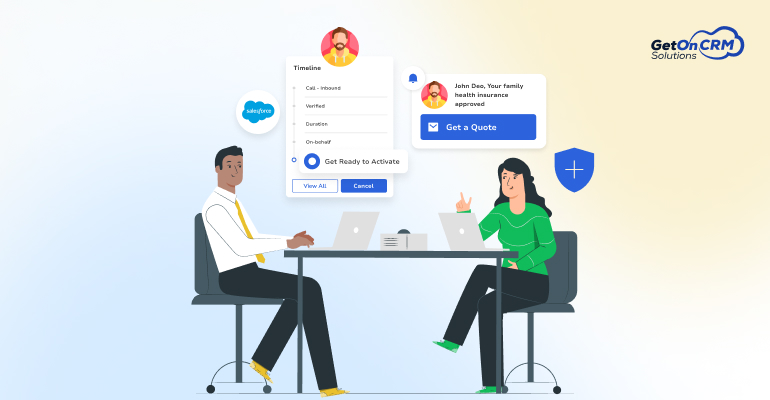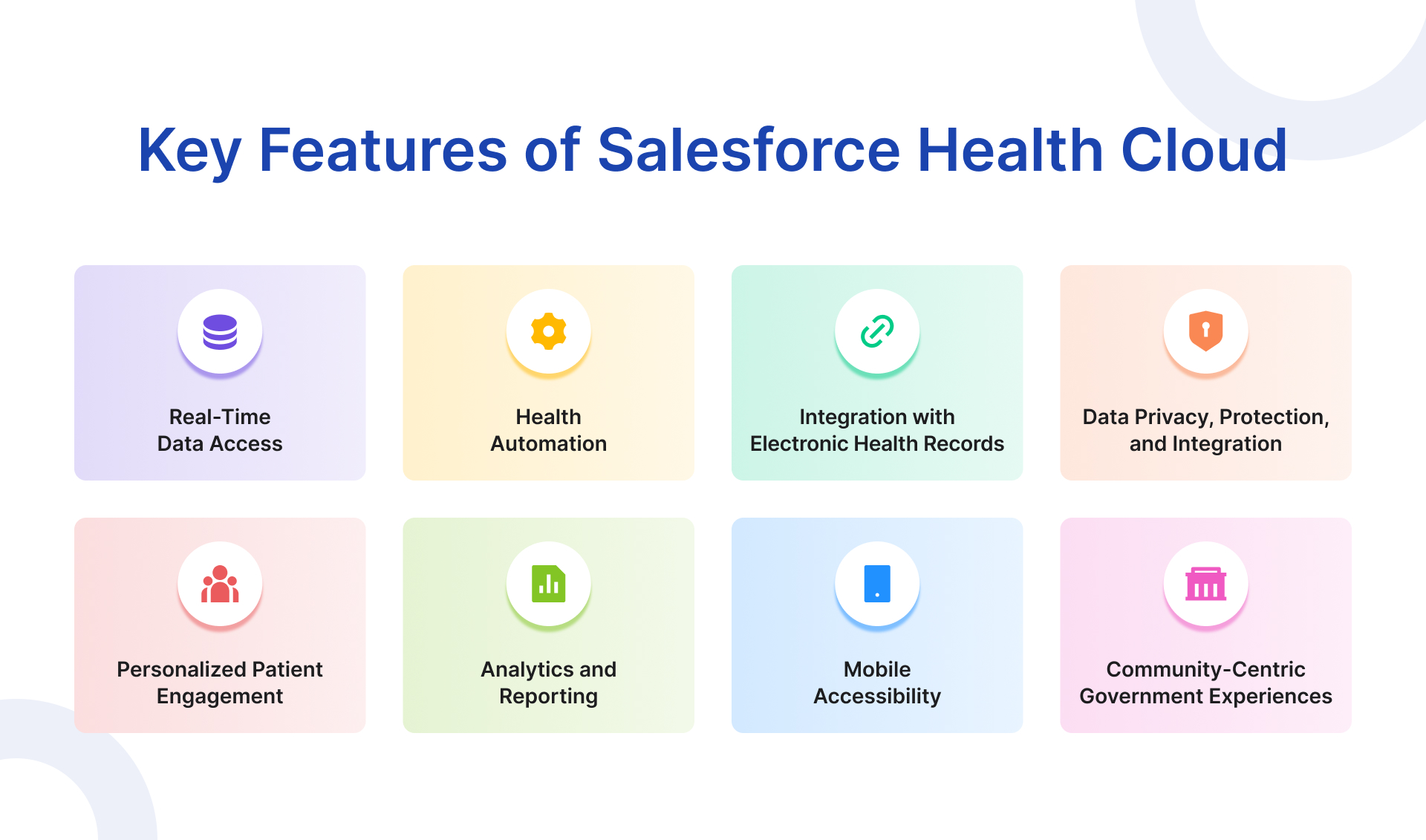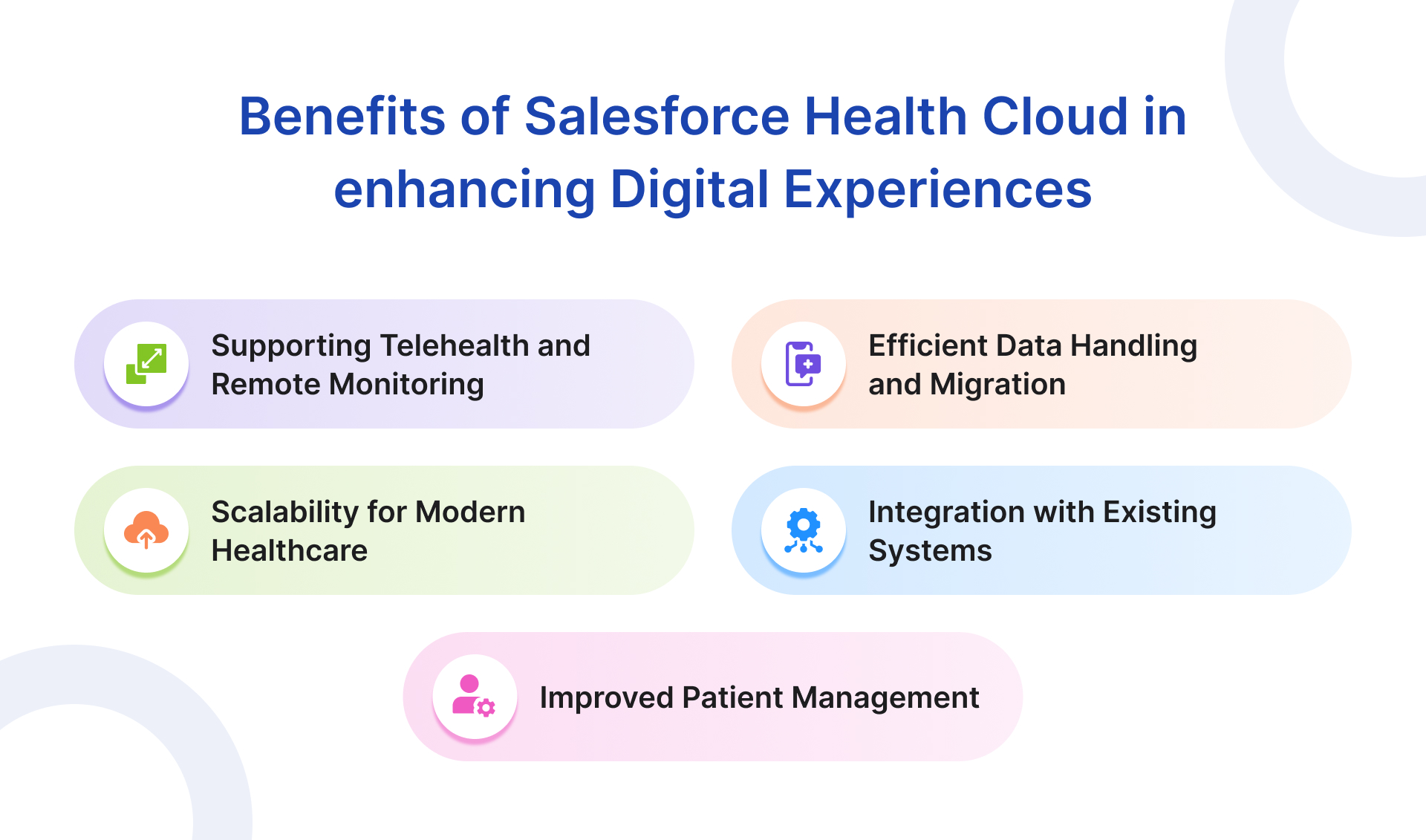When speaking of healthcare, it encompasses technologies like telemedicine, electronic health records (EHRs), data analytics, and many others that are transforming the landscape today. These health-tech innovations improve patient access, care coordination, and administrative efficiency. The digitization of Healthcare offers significant benefits, including streamlined processes and better patient outcomes.
The global health Cloud market is projected to reach USD 115.7 billion by 2030, growing at a compound annual growth rate (CAGR) of 15.6%.
In this scenario, the Health Cloud is at the forefront of this transformation, offering a unified platform that enhances patient care and operational efficiency. A comprehensive 360-degree view of patient data enables healthcare providers to deliver personalized, proactive care.
Thus, Salesforce Health Cloud stands out as a comprehensive solution designed to meet the unique demands of the healthcare industry. Salesforce for Healthcare provides robust solutions to address the digital needs of modern Healthcare.
What is Salesforce Health Cloud?
With the global healthcare CRM market projected to reach $17.4 billion by 2026.
Salesforce Health Cloud has become a pivotal tool for health organizations aiming to enhance patient care and streamline operations.
Salesforce Health Cloud is a Healthcare CRM designed to enable better patient management and build strong connections between health organizations, providers, and patients. By centralizing patient information, it helps healthcare professionals access real-time data, improving care coordination and decision-making. Its integration with Electronic Health Records (EHRs) ensures comprehensive patient profiles that cater to modern healthcare needs.
Salesforce Health Cloud Architecture
The Health Cloud architecture is built on Salesforce’s robust platform, ensuring secure data migration, integration, and scalability. It uses API-based frameworks for connecting with EHRs and other healthcare systems, enabling seamless data exchange. By prioritizing data privacy, protection, and integration, it ensures compliance with healthcare regulations like HIPAA.
Integration Capabilities with Other Healthcare Systems
Health Cloud interacts smoothly with various healthcare systems, including electronic health records, practice management systems, and third-party applications. Its robust API capabilities enable smooth data exchange and interoperability, ensuring that healthcare providers have access to comprehensive patient information.
Key Features of Salesforce Health Cloud
The modern features of Salesforce Health Cloud help streamline healthcare processes, ensuring providers can focus on delivering quality patient care while maintaining data privacy and compliance to support better health outcomes.
Let’s explore the key features that make Health Cloud a leader in the healthcare industry.
Real-Time Data Access
Real-time data access in Health Cloud empowers healthcare professionals to make timely, well-informed decisions. By offering a 360-degree view of patient health, this feature consolidates data from multiple sources into a unified dashboard. This ensures providers can access critical information such as medical history, lab results, and current treatments instantly, enabling better care coordination.
Benefits of Real-Time Data:
- Immediate access to patient information, reducing delays in treatment.
- Facilitates proactive care by identifying trends and patterns.
360-Degree View of Patient Health:
- Unified patient profiles help providers understand the full scope of health conditions.
- Easy collaboration across healthcare teams using centralized data.
Health Automation
Health automation in Salesforce Health Cloud advances patient care that automates routine tasks and administrative processes, such as appointment scheduling, follow-up reminders and care plan updates. This automation reduces manual errors, frees up staff time, and improves overall operational efficiency, allowing healthcare providers to focus on delivering quality care.
Automation Benefits:
- Reduces manual effort, minimizing the risk of errors.
- Ensures timely patient communication, improving satisfaction.
Example Use Cases:
- Automated prescription refill reminders.
- Efficient follow-up management post-discharge.
Also read : Strategic Planning and Adopting Healthcare Automation – Bridging the Gap
Integration with Electronic Health Records (EHRs)
Salesforce Health Cloud seamlessly integrates with EHR systems, ensuring healthcare professionals have a single source of truth for patient information. This integration bridges the gap between administrative and clinical data, enabling more cohesive patient care delivery.
Key Advantages:
- Unified patient data for better decision-making.
- Simplified data migration between systems, ensuring continuity of care.
Data Privacy, Protection, and Integration
With data privacy and protection being critical in modern healthcare, Salesforce Health Cloud prioritizes robust security measures. It adheres to industry standards like HIPAA, ensuring patient data remains secure and compliant. Additionally, it supports integration with various healthcare systems for seamless operations.
Highlights:
- Secure Health Cloud architecture to protect sensitive information.
- Comprehensive integration capabilities with third-party applications and health organizations.
Personalized Patient Engagement
Personalized care is at the core of Health Cloud. The platform enables healthcare providers to deliver tailored communication and treatment plans, ensuring patients feel valued and supported throughout their care journey.
Features Enabling Personalization:
- Customized care plans based on patient history and preferences.
- Proactive health tips and reminders to foster engagement.
Analytics and Reporting
Salesforce Health Cloud provides actionable insights through its advanced analytics and reporting tools. Healthcare organizations can track key metrics, identify trends, and optimize resource allocation for better outcomes.
Key Analytics Capabilities:
- Real-time reporting to monitor patient outcomes.
- Predictive analytics to anticipate patient needs.
Mobile Accessibility
Modern healthcare demands mobility, and Salesforce Health Cloud delivers with its mobile-friendly design. Providers can access patient information and perform critical tasks on the go, ensuring care continuity regardless of location.
Mobile Benefits:
- Quick access to data during hospital rounds.
- Enables telehealth support for remote consultations.
Community-Centric Government Experiences
Salesforce Health Cloud also supports community-focused healthcare initiatives by enabling government agencies and non-profits to deliver healthcare services more effectively. Its features cater to the unique needs of public health programs, ensuring that communities receive the care they need.
Benefits of Salesforce Health Cloud in enhancing Digital Experiences
Salesforce Health Cloud has become a pivotal tool in the healthcare industry. Designed to address the needs of modern healthcare, it provides health organizations with a comprehensive Healthcare CRM solution.
Let’s explore its key benefits and understand how it supports better care delivery and operational efficiency.
Improved Patient Management
Efficient patient management is essential for delivering quality care. Salesforce Health Cloud simplifies complex processes with its patient-first approach, enabling healthcare providers to offer personalized and proactive care.
Key Points:
Simplification of Processes: Healthcare CRM for patient management organizes patient data in one place, making it accessible to patient-care teams. This minimizes delays and enhances coordination.
Better Care Delivery: Healthcare organizations can track patient histories, appointments, and interactions, ensuring continuity and precision in care plans.
Efficient Data Handling and Migration
The healthcare industry handles sensitive and vast amounts of data. Salesforce Health Cloud addresses this need with robust data migration and management tools. Further, it helps healthcare providers access comprehensive information quickly, facilitating more efficient and effective decision-making.
Key Points:
- Seamless Data Migration: Its migration tools ensure that data moves securely between systems, reducing downtime and disruption.
- Error Reduction: The system minimizes errors during data transfers, leading to enhanced data quality and reliability.
Scalability for Modern Healthcare
Whether for a small clinic or a large healthcare organization, Health Cloud is adaptable to various healthcare environments making it a future-proof choice for evolving digital healthcare needs.
Key Points:
- Flexible for Different Sizes: It supports organizations of all scales, from single-provider practices to multi-location hospitals.
- Adaptability: Health Cloud architecture evolves with modern healthcare needs, ensuring long-term usability and efficiency.
Integration with Existing Systems
Salesforce Health Cloud excels in integrating with both Salesforce technology and external systems, such as Electronic Health Records (EHRs).This interoperability eliminates data silos, streamlines workflows, and ensures that healthcare organizations can leverage their current infrastructure while adopting advanced digital tools.
Key Points:
- Compatibility with Salesforce Technology: It seamlessly integrates with other Salesforce tools for streamlined workflows.
- EHR Integration: Health organizations can link patient data from EHR systems, ensuring a holistic view of patient health.
Supporting Telehealth and Remote Monitoring
With the rise of virtual care, Salesforce Health Cloud plays a pivotal role in supporting telehealth and remote patient monitoring, ensuring seamless and consistent patient care.
By enabling healthcare providers to adopt advanced technologies, it bridges gaps in service delivery while helping them stay ahead in the era of digital health. Salesforce empowers healthcare organizations to meet modern patient expectations with innovative, patient-centered solutions.
Key Points:
- Telehealth Features: Providers can schedule and conduct virtual appointments within the system.
- Real-Time Data Monitoring: The platform supports remote tracking of health metrics, ensuring timely interventions.
Basic Implementation of Salesforce Health Cloud
Implementing Salesforce Health Cloud is a strategic step for healthcare CRM organizations aiming to improve patient management, optimize workflows, and enhance data integration.
Let us see the steps you need to follow to implement Salesforce Health Cloud
1. Understanding Business Needs
Before implementing Salesforce Health Cloud, it is important to thoroughly assess the organization’s specific healthcare needs. This includes reviewing current patient management processes, identifying areas that need improvement, and understanding which functionalities will best support business goals.
2. Planning Data Migration
Data migration is essential for a successful Health Cloud implementation. It involves ensuring the accurate and secure transfer of patient data, historical records, and other critical information from legacy systems. A comprehensive plan for data mapping, validation, and testing ensures minimal disruption during the migration process.
3. Setting Up Health Cloud Architecture
Configuring the Health Cloud architecture is essential to align it with the healthcare organization’s business goals. The architecture must integrate with other systems like EHRs and automate processes to improve efficiency. A solid setup supports a unified patient data view and prepares for future scalability.
4. Training and Onboarding
Thorough training and onboarding are crucial for successful Health Cloud adoption. The entire team, from doctors to administrative staff, must understand how to use the platform effectively. Training should cover key features such as patient tracking, health automation, and data privacy to ensure proper usage.
5. Ongoing Support and Optimization
Ongoing support and system optimization are essential after Salesforce Health Cloud’s initial implementation. Regular maintenance and updates ensure the system remains efficient, incorporates new features, and addresses any issues. This continuous support helps the system evolve alongside the healthcare organization’s changing needs.
Real-Life Use Case of Salesforce for Healthcare
Elevating Customer Service for a Leading Healthcare Provider Using Salesforce
Salesforce transformed customer service for a leading healthcare provider by unifying disparate customer data sources through the integration of Salesforce Marketing Cloud and Sales Cloud.
The transformation enabled personalized interactions and automated lead management, driving significant improvements in customer experience.
The provider achieved increased email engagement rates, streamlined lead management, and a more efficient approach to operations. These changes contributed to higher sales and a stronger connection with their customers.
Enhancing Medical Licensing System with Salesforce Public Sector Solutions
Salesforce Public Sector Solutions significantly transformed Mexico’s government medical board’s licensing process.
With the implementation of Salesforce’s cloud solutions, including Experience Cloud and Omni Studio, the board streamlined application submissions, enhanced compliance management, and improved communication, creating a more efficient and customer-focused service experience.
Challenges and Essential Solutions in Healthcare Digitization
The digitization of Healthcare is transforming care and operational efficiency, yet it introduces several unique challenges that organizations must address. Navigating these obstacles effectively is crucial to harnessing the full potential of digital technologies.
This section explores critical challenges faced by healthcare providers and presents strategic solutions to overcome them, ensuring a successful digital transformation journey.
Handling Large Volumes of Data
Healthcare generates massive data from EHRs, imaging, and patient-generated sources. Efficient management and security are essential. Scalable cloud storage solutions and advanced data analytics platforms, like Salesforce Health Cloud, can handle large datasets and extract actionable insights using machine learning, improving decision-making and patient care.
Ensuring Interdepartmental Data Consistency
Disparate systems and standards across departments lead to inconsistent data and communication barriers. Health Cloud’s integration features allow for the standardization of data formats and integration protocols, creating a unified data repository that promotes consistency and reduces errors.
Real-Time Data Accessibility
Healthcare providers need real-time access to patient data for timely decisions, especially in emergencies. Utilizing Health Cloud’s real-time data synchronization and mobile capabilities, along with edge computing solutions, ensures instant access to information, reducing latency.
Maintaining High Levels of Data Privacy
Increased digital integration raises the risk of data breaches and unauthorized access. Strengthening data privacy with advanced encryption, multi-factor authentication, and role-based access controls, supported by Health Cloud’s security features, helps safeguard patient data.
Managing Rapid Technological Change
The rapid pace of technological advancement challenges organizations to stay current. Developing a flexible IT strategy for continuous updates, investing in ongoing staff training, and partnering with technology vendors like Salesforce ensures organizations leverage innovations effectively.
Addressing Disparities in Digital Health Literacy
Patients with low digital literacy may struggle with digital health tools. Creating intuitive interfaces for portals and apps, offering digital literacy training, and providing multi-channel support can help them navigate these tools and maximize their benefits.
Future of Healthcare with Salesforce Health Cloud
As the future of Healthcare becomes more digital, the Health Cloud is leading the way. With emerging trends like AI integration and predictive analytics, this platform is set to revolutionize operational efficiency.
AI-Powered Personalized Care
Salesforce Health Cloud will utilize advanced AI algorithms to craft highly individualized patient care recommendations. By analyzing comprehensive patient data—including health records, lifestyle choices, and genetic information—AI will generate tailored treatment plans. This precision in care aims to enhance treatment efficacy and outcomes.
Virtual Health Assistant Integration
The platform will incorporate virtual health assistants to streamline routine interactions and administrative functions. These AI-driven tools will manage tasks such as appointment scheduling, medication reminders, and answering basic health queries. This automation will allow healthcare providers to concentrate on more complex clinical needs.
Comprehensive Patient Engagement Platforms
The platform will develop robust engagement solutions that include interactive health education, personalized wellness plans, and support networks. These tools will empower patients to actively participate in their health management, leading to improved adherence to care plans and better overall health outcomes.
Real-Time Health Monitoring
Salesforce Health Cloud will integrate with wearable devices and IoT health technologies to enable continuous health monitoring. This real-time data collection will provide healthcare providers with immediate insights into vital signs and potential health issues. Early detection and intervention will become more effective, improving patient care.
Salesforce Health Cloud: A New Era in Healthcare Management
As we wrap up our exploration of Salesforce Health Cloud, it’s clear that this robust platform is setting a new standard for healthcare organizations.
CRM is rapidly transforming the healthcare industry by enabling organizations to deliver more personalized, efficient, and proactive care. Choosing Health Cloud, will provide healthcare a deeper insights into patient needs, improving patient engagement, streamlining care coordination, collaboration across care teams and ensuring data security pave the way for a more efficient and patient-centric healthcare system—all within a secure, unified platform.
Whether it’s a small clinic or a large health organization, Salesforce Health Cloud provides a flexible and scalable solution. Further, opting for a trusted Salesforce Consulting Partner can be instrumental in unlocking the potential of Health Cloud for the healthcare organization.
So, why not take the step toward modernizing healthcare management?
Explore Salesforce Health Cloud Solutions today and discover how it can elevate patient care and improve your healthcare organization’s efficiency.

















